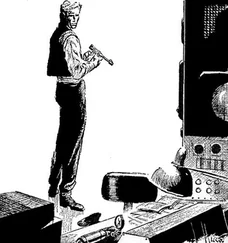Harry Harrison - The Turing Option
Здесь есть возможность читать онлайн «Harry Harrison - The Turing Option» весь текст электронной книги совершенно бесплатно (целиком полную версию без сокращений). В некоторых случаях можно слушать аудио, скачать через торрент в формате fb2 и присутствует краткое содержание. Год выпуска: 1992, ISBN: 1992, Издательство: Viking, Жанр: Фантастика и фэнтези, на английском языке. Описание произведения, (предисловие) а так же отзывы посетителей доступны на портале библиотеки ЛибКат.
- Название:The Turing Option
- Автор:
- Издательство:Viking
- Жанр:
- Год:1992
- ISBN:978-0-670-84528-6
- Рейтинг книги:3 / 5. Голосов: 1
-
Избранное:Добавить в избранное
- Отзывы:
-
Ваша оценка:
- 60
- 1
- 2
- 3
- 4
- 5
The Turing Option: краткое содержание, описание и аннотация
Предлагаем к чтению аннотацию, описание, краткое содержание или предисловие (зависит от того, что написал сам автор книги «The Turing Option»). Если вы не нашли необходимую информацию о книге — напишите в комментариях, мы постараемся отыскать её.
The Turing Option — читать онлайн бесплатно полную книгу (весь текст) целиком
Ниже представлен текст книги, разбитый по страницам. Система сохранения места последней прочитанной страницы, позволяет с удобством читать онлайн бесплатно книгу «The Turing Option», без необходимости каждый раз заново искать на чём Вы остановились. Поставьте закладку, и сможете в любой момент перейти на страницу, на которой закончили чтение.
Интервал:
Закладка:
His eyes were open. He saw a face. The face had gray hair. He was very tired. His eyes closed and he slept.
“You saw that, didn’t you!” Dr. Snaresbrook clasped her hands together with excitement. Benicoff nodded, puzzled but agreeing.
“I saw his eyes open, yes. But, well—”
“It was terribly important. Did you notice that he looked at my face after I spoke?”
“Yes — but is that a good response?”
“Not just good, but immensely significant. Think for a moment. You are looking at a young man’s body that for a long time had a disconnected mind — broken into disconnected fragments. But you see what happened now — he heard my voice and turned to look at my face. The important thing is that the brain centers for auditory recognition are in the back half of the brain — but the eye-motion controls are in the front part of the brain. So we must have got the new connections at least partly correct. And there was more. He was trying to obey — to understand my command. This means that a good many mental agencies must have been engaged. And note that he labored very hard, made mental connections, rewarded himself with a feeling of happiness — you saw the smile. This is tremendous.”
“Yes, I did see him smile a little. It’s good that he is not depressed, considering his injuries.”
“No. That’s not the important point at all. If I were concerned about his attitude, I’d prefer for him to be depressed. No, my point is that regardless of whether he’s pleased or annoyed, at least he isn’t apathetic. And if his systems can still assign values to experiences, then he can use those values for self-reinforcement — that is, for learning. And if his systems can learn properly, he’ll be able to help us repair more of the damage.”
“When you put it that way — then I see why it is important. What next?”
“The process continues. I will let him sleep, then try again.”
“But won’t he lose his short-term memories? The memories that you have restored? Won’t they fade away if he sleeps?’
“No — because these are not short-term memories but reconnected K-lines or functions that existed before. K-lines are nerve fibers connected to sets of memories, sets of agents, that reactivate previous partial mental states. Think of them as reconnected circuits. Not reconnected in fragile human synapses, but in tough computer-memory units.”
“If you are right — that means that everything you have done is working out,” Benicoff said, hoping that his lack of enthusiasm did not show in his voice. Was the doctor reading an awful lot into one little flicker of a smile? Perhaps wanting to believe so much that she might be deceiving herself. He had been expecting something more dramatic.
Erin Snaresbrook had not. She had not known what to expect in this totally new procedure, but was immensely satisfied with the results now. Let Brian rest, then she would talk to him again.
A room. He was in a room. The room had a window because he knew what a window looked like. There was someone else in the room. Someone with gray hair and a white thing on her body.
Body? Her? The white thing was a dress and only hers wore dresses.
That was good. He smiled widely. But not completely right. The smile slowly slipped away. It was almost right, he had done well. The smile returned and he slept.
What had happened the night before? He stirred with fear; he couldn’t remember, why was that? And why couldn’t he roll over? He was being held down. Something was very wrong, he didn’t know what. It took an effort of will to open his eyes — then quickly clamp them shut since the light burned them painfully. He had to blink away the tears when he hesitantly opened them again, looked up at the face of the stranger looming close above him.
“Can you hear me, Brian?” the woman said. But when he tried to answer, his throat was so dry that he started coughing. “Water!” A cool, hard tube pushed between his lips and he sucked in gratefully. Choked on it, coughed and a wave of pain swept through his head. He moaned in agony.
“Head… hurts,” he managed to say.
Nor would the pain go away. He moaned and twisted under the assault, pain so great that it overwhelmed all other sensations. He was not aware of the tiny slice of pain when the needle went into his arm, but did sigh with relief when the all-encompassing agony began to ebb.
When he opened his eyes again it was with great hesitation. Blinked tears as he fought to see.
“What… ?” His voice sounded runny but he did not understand why. What was it? Wrong? Too deep, too rasping. Listened as the other voice came from a great distance.
“There’s been an accident, Brian. But you are all right now — you are going to be all right. Do you have any pain? Do you hurt anywhere?”
Hurt? The pain in his head was lessening, was being muffled somehow. Other pain? His back, yes his back — his arm too. He thought about that. Looked down and could not see his body. Covered. What did he feel? Pain?
“Head… my back.”
“You’ve been hurt, Brian. Your head, your arm and back too. I’ve given you something to take away the pain. You’ll feel better soon,” Erin said, looking down at him with grave concern at the white face on the pillow, framed by the crown of bandages. His eyes were open, reddened and black-rimmed, blinking away the tears. But he was looking at her, questioning, following her when she moved. And the voice, the words clear enough. Though wasn’t there a marked Irish accent to what he said? Brian’s accent had changed after all his years in America. But an earlier Brian would certainly have more of the brogue he had brought to this country. This was Brian all right.
“You have been very ill, Brian. But you are better now — and will get better.”
But which Brian was she talking to? She knew that as we grow we learn new things all of the time. But we do not burden our minds with remembering every detail of how we teamed a new process, how to tie a shoe or hold a pencil. The details of remembering belong to the personality that remembered. But this personality is left behind, buried when the new personality develops. How this was done was still unclear — perhaps all the old personalities still existed at some level. If so — which one was she talking to now?
“Listen, Brian. I am going to ask you a very important question. How old are you? Can you hear me? Can you remember your age — how old are you?”
This was much harder than anything he had ever thought about before. Time to go to sleep.
“Open your eyes. Sleep later, Brian. Tell me — how old are you?”
This was a bad question. Old? Years. Time. Date. Months. Places. School. People. He did not know. His thoughts were muddled and this confused him. Better to go back to sleep. He wanted to — but sudden fear chilled him, made his heart hammer.
“How old — am I? I can’t — tell!” He began to cry, tears oozing from his tight-clamped lids. She caressed his sweat-damp forehead.
“You can sleep now. That’s right. Close your eyes. Sleep.” She had come along too fast, pushed him too hard. Made a mistake — cursed her own impatience. It was too early yet to integrate his personality into time. It had to integrate into itself first. But it was coming. Each day there was that much more of a personality present, rather than a collection of lightly linked memories. It was going to work. The process was slow — but she was succeeding. Brian’s personality had been brought as far forward in his own personality time line as was possible. How far that was she still did not know; she had to be patient. The day would come when he would be able to tell her.
More than a month went by before Dr. Snaresbrook asked the question again.
Читать дальшеИнтервал:
Закладка:
Похожие книги на «The Turing Option»
Представляем Вашему вниманию похожие книги на «The Turing Option» списком для выбора. Мы отобрали схожую по названию и смыслу литературу в надежде предоставить читателям больше вариантов отыскать новые, интересные, ещё непрочитанные произведения.
Обсуждение, отзывы о книге «The Turing Option» и просто собственные мнения читателей. Оставьте ваши комментарии, напишите, что Вы думаете о произведении, его смысле или главных героях. Укажите что конкретно понравилось, а что нет, и почему Вы так считаете.










